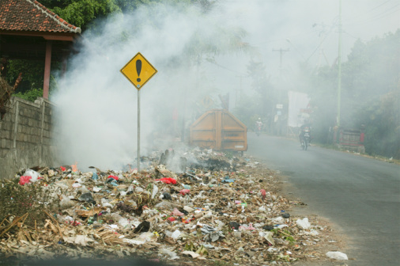Jan 07, 2026
Jan 07, 2026
by S. C. Arora
Environment
 There is no end to man’s greed. To meet the perceived needs of humans, the natural resources are being depleted rapidly. Forests have been denuded and acres of fertile land have been usurped by industrialists or land sharks. Effluents from factories are being drained into rivers polluting the waters, affecting human and aquatic life. Gases and toxic matter from automobiles and particulate-ridden smoke from chimneys have polluted the air. I can recall that my car, parked at Noida, used to get blanketed by soot left by the smoke belching out of Badarpur Thermal Power Plant. Research has shown that such pollutants not only cause breathing problems in living beings but can damage the child’s lungs even in the womb.
There is no end to man’s greed. To meet the perceived needs of humans, the natural resources are being depleted rapidly. Forests have been denuded and acres of fertile land have been usurped by industrialists or land sharks. Effluents from factories are being drained into rivers polluting the waters, affecting human and aquatic life. Gases and toxic matter from automobiles and particulate-ridden smoke from chimneys have polluted the air. I can recall that my car, parked at Noida, used to get blanketed by soot left by the smoke belching out of Badarpur Thermal Power Plant. Research has shown that such pollutants not only cause breathing problems in living beings but can damage the child’s lungs even in the womb.
Reckless deforestation has led to floods: emissions from factories and motorised vehicles have caused global warming which in addition to affecting birds, wildlife and human beings is bringing climatic change. Glaciers are melting. Many things on which our future depends are in jeopardy. Many forms of wild life are disappearing from the planet. Flora and fauna, unable to adapt to global warming, may perish. Ecology has been drastically imbalanced. Students graduate without any broad, integrated sense of unity of Nature.
We are experiencing an explosion of successful people – success as our culture sees it – but what we do need is more peace-makers, healers, restorers and lovers of Nature. Therefore, it is imperative that not only massive exploitation of the planet is halted but also fertility of land, growth of plants, saving of biodiversity, purification of water and air promoted. That is the reason that our scriptures and forefathers treated air, water, trees etc. as deities. The basic aim was to preserve the environment. If it is not done the devastation we are inflicting on our life- supporting ecosystems will finally become irreversible and the prospects for the very survival of human race will be in question! It is a myth that we can adequately restore what we have dismantled. We must save ourselves from self-annihilation. Although, they need not be trained to become carborexics, it is absolutely necessary that students be made aware of these dangers and exhorted to reduce what they use, re-use what they can use, to conserve energy, recycle things and be more environmentally conscious so that they use natural resources in a sustainable manner when they are at the helm of affairs.
Amassing Wealth Vs Pursuing Excellence
The pounding that the sensex has taken due to the global economic meltdown since September 08 has very clearly established the ephemeral character of money. So much so that Kartik Rajaram, an Indian-American committed suicide after killing his family: Lakshminivasa Rao Nerusu another Indian-American killed his wife and two teenaged children. German billionaire Adolf Merckle committed suicide, in despair over the huge losses suffered by his business empire during the financial crisis. These three men were constrained to take this extreme step because of monetary loss. Even in India many people are in depression due to great depletion in their financial fortunes: it has become a story of riches to rags to misery.
It makes me wonder whether comforts and pleasures bought by accumulated wealth can bring happiness to mankind. It can buy us the most luxurious bed but it cannot give us sound, refreshing sleep: it can provide nutritious food but cannot give us appetite. People get enticed by the glitz of consumerism and buy things which they don’t need. In today’s consumerist society we constantly want more – a bigger house, a flashy car, a new Blackberry cell phone. We feel if we had the latest gadgets and a lot of money to splurge we shall be happier but it doesn’t happen.
Thirty years ago I had a rickety Fiat car which often I had to push. Ten years later I bought a Maruti 800 whose AC was not very effective hence I went in for a Zen. That, as per my new employer, did not match my status and, therefore, perforce I had to buy an Esteem – the slogan then being “People with esteem drive Esteem”. Now I drive a Honda City but I am the same: my happiness has not been augmented. In fact my heart is wrenched more deeply whenever there is a scratch or a dent!
The possession of material things is a race which has no end. The commercial ads in the print and electronic media will not let us rest in peace. They tempt us and we become victims. Industrialists and manufacturers play on human weakness and continuously keep generating new desires in us which ultimately remain unfulfilled and become the biggest source of disappointment and tension.
“The superior man understands what is right; the inferior man understands what will sell.” – Confucious
The greed of gain has no time or limit to its capaciousness. Its only aim is to produce and consume. The lust for pelf is ruthlessly ready to destroy relationships – between brothers, between parents and children, friends, partners in business etc. No hatred exceeds that of families riven by property
disputes.
Not even the brightest intellect can insure against the destructive potency of wealth. Its headiness blinds us to the cantankerous nature of money. Up to a point money can be useful as it makes life comfortable but beyond that it serves no purpose except providing intoxication. Poverty, of course, oppresses and incapacitates. Therefore, money is definitely needed to live in reasonable comfort – it does provide ‘roti, kapra aur makaan’ – but it is only when the urge to amass wealth becomes a craving, one begins to act like a hungry man who has not eaten for many days – eating mouthful after mouthful and consequently falling ill. The following parable explains quite lucidly the futility of the material possessions:
A ‘saadhu’ went to a rich man’s house and asked for alms. The family was kind enough to ask him as to what he would like to have – food, clothes, money or anything else. He turned down all offers but expressed his desire to be taken to the room where their wealth was kept. The family obliged. He requested them to open the cupboard where money, jewellery and other expensive things were lying. Once he had seen all that he asked them to lock the cupboard again. The astonished family inquired of him as to what he had gained? In his wisdom he explained that all this wealth lying in the cupboard was not going to be used by them. He would henceforth think it belongs to him as he was also not going to use it.
There is no solution as long as good life is thought of in terms of acquisitions. Actually there is more to life than money. People need more than shopping malls to satisfy their innerself: that can come only through pursuit of excellence in their chosen fields. We need to engage ourselves deeply in our respective callings for fulfillment. Real happiness comes only when we are immersed in tasks that we find engaging and challenging. Let us, therefore, not run after money: if we are engaged in doing our best, money will automatically flow in. Let us pay heed to the beautiful exhortation by the Pakistani Band “Strings” – We have to transcend ourselves. In the process of achieving excellence we shall all find an inner glow.
“Ah, But a man’s reach should exceed his grasp, or what is the heaven for.” – Robert Browning
Therefore, education should not only sensitise our children to the contaminating nature of excessive money but make us also aware that its pursuit is a shimmering mirage!
Nature Rejuvenates
Modern day living is ruthlessly stressful, what with the hectic routine, commuting long distances, finding good schools for young children, admitting youngsters into prestigious colleges with back-breaking competition, satisfying the employer, meeting the demands of the spouse and a host of other problems. There doesn’t seem to be any respite from these perennial problems. Not only this: you walk through the streets and you listen to blasting music, honking of vehicles, other loud voices and dust all around. Even the houses of gods, which should possess quietude, blare away their messages. One doesn’t know where to have a few minutes of peace and re-energize.
 Although Nature’s bounty can be enjoyed by all, very few care to do so. Pause a moment and sit under a shady tree in a forest: feel the presence of peace. Look at the humble serenity of a flower! Notice the intertwined petals of a Chrysanthemum. Sit by the side of a stream rolling down the mountains and listen to its lilting music. Watch the dew drops glistening in the rays of the morning sun. Have you ever been held in awe by the hairpin bends up on the hills? Have you ever watched the penetrating glow of the rising sun or the sky aflame at sunset? Go to the hills and breathe in the fresh air with balmy fragrance wafting out from the pine trees. Observe the shimmering snow-clad peaks or a star studded sky on Amavasya (moonless) night or the cool, soothing light of the moon on Poornmashi (full moon) or the silver lining silhouetting the dark clouds. Listen to the melodious songs sung by a Koel or admire the captivating dance of a peacock in rainy season!
Although Nature’s bounty can be enjoyed by all, very few care to do so. Pause a moment and sit under a shady tree in a forest: feel the presence of peace. Look at the humble serenity of a flower! Notice the intertwined petals of a Chrysanthemum. Sit by the side of a stream rolling down the mountains and listen to its lilting music. Watch the dew drops glistening in the rays of the morning sun. Have you ever been held in awe by the hairpin bends up on the hills? Have you ever watched the penetrating glow of the rising sun or the sky aflame at sunset? Go to the hills and breathe in the fresh air with balmy fragrance wafting out from the pine trees. Observe the shimmering snow-clad peaks or a star studded sky on Amavasya (moonless) night or the cool, soothing light of the moon on Poornmashi (full moon) or the silver lining silhouetting the dark clouds. Listen to the melodious songs sung by a Koel or admire the captivating dance of a peacock in rainy season!
Nature has nurturing, regenerating powers: it rejuvenates us. Appreciation of nature helps us in removing destructive tendencies like jealousy, hatred, aggression, selfishness. Keats has beautifully put it in his poem – ‘Ode on a Grecian Urn’
“… beauty is truth, truth beauty
that is all ye know on earth,
and all ye need to know…”
I strongly believe that if education has to be meaningful it must initiate children into appreciating and enjoying Nature which paradoxically is a tranquilizer as well as a stimulant.
Anger Management
I was shocked to read in the newspaper of 12th October, 2008 about the lack of self control in us and some of us going berserk with anger. First case: some unknown customers stabbed and killed a head cook in a restaurant because the cook refused to give ‘papad’ to them while they were having dinner there. Second one: three men went to a mobile shop to get a prepaid recharge for Rs.100/- for their cell phone. When that was done they refused to pay the amount and an altercation took place. Consequently the customers poured kerosene oil on the shopkeeper and set him on fire.
On the flimsiest excuse people lose their cool and fights begin over non-issues. We see it on the roads of all metropolitan towns. People have no patience and start honking in a fraction of a second. An unintentional touch of one vehicle with another leads to heated discussions and quite often people come to blows. In a couple of cases people have been shot at as well. Most of us seem to be sitting on the edge and flare up at the slightest provocation. What we need is a little understanding and patience to handle the situation.
 Most of us seem to think that we are perfect and only others have faults. We are always right and others invariably in the wrong. It is imperative that we begin to realize human failings and limitations. Many of our relationship problems arise because we do not accept our partner / co-worker as he/she is. The solution does not lie in trying to change people to as we would like them to be, but to accept them fully as they are (for we cannot change them), without the slightest judgment: the problems will disappear. Actually problems do not exist outside our minds: when we stop seeing others as problematic, problems vanish. If we make ourselves free from resentment and blame game we shall rid ourselves of anger. Remember, there is nobody ‘out there’ trying to catch us. As soon as this dawns on us we shall automatically develop tolerance of others’ imperfections.
Most of us seem to think that we are perfect and only others have faults. We are always right and others invariably in the wrong. It is imperative that we begin to realize human failings and limitations. Many of our relationship problems arise because we do not accept our partner / co-worker as he/she is. The solution does not lie in trying to change people to as we would like them to be, but to accept them fully as they are (for we cannot change them), without the slightest judgment: the problems will disappear. Actually problems do not exist outside our minds: when we stop seeing others as problematic, problems vanish. If we make ourselves free from resentment and blame game we shall rid ourselves of anger. Remember, there is nobody ‘out there’ trying to catch us. As soon as this dawns on us we shall automatically develop tolerance of others’ imperfections.
Often when we feel wronged, our brain just seems to explode: if we have been cheated of money we lose our temper: if we have been betrayed we begin to fume. If our ego is hurt we blow our top off. In such situations self-control or moderation eludes us completely.
Anger Management is a gradual process. Anger is a natural feeling but can be monitored and minimized. Psychologists tell us that when we are getting into a rage, to diffuse the
situation we should either move away from the scene or count ten before uttering a word. Anger is like froth which subsides very fast. It is a question of overcoming that momentary impulse. When we get angry, even legitimately, we only harm ourselves. Lord Buddha cautions us, “Holding on to anger is like grasping a hot coal with the intent of throwing it at someone else; you are the one who gets burned.”
Our heart rate and blood pressure shoot up. We cannot think clearly: anger robs us of our reason and good sense. At that time wrong decisions may be taken. We may even run the risk of spoiling our relationships or losing our job. We may hurt or humiliate and thus annoy or alienate people who may otherwise be happy to work with us. We should keep in mind that we don’t own the world. Things cannot always go our way. Some difficulties are a part of life. We cannot reduce the traffic jam but we may try to find an alternative route or wait patiently for our turn to move. There is no situation so bad that it cannot be accepted patiently, with an open, accommodating mind. We shall benefit by following Emerson’s advice, “Adopt the pace of Nature – Her secret is patience.”
08-Aug-2010
More by : S. C. Arora